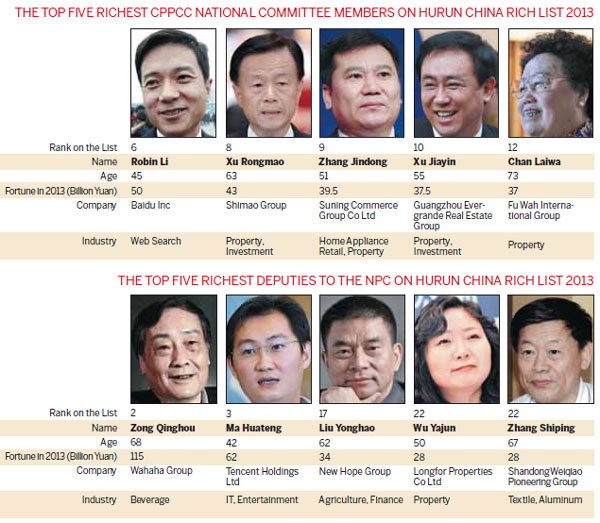Billionaires speak out on their role

Editor's Note: With an expanding group of super-rich in the world's second-largest economy, a growing number of billionaires have emerged in China's political arena. As a major part of the country's political institutions, the National People's Congress, the top legislature, and the Chinese People's Political Consultative Conference National Committee, the top political advisory body, have more than 100 billionaire representatives who are on the Hurun China Rich List. How do they play their role in politics? What do they think of policies that may affect their business? China Daily interviewed four of them to get their thoughts:

Liu Yonghao
Chairman of New Hope Group.
An NPC deputy of Sichuan province.
Ranking 17th on the Hurun China Rich List 2013 with net worth of 34 billion yuan ($5.54 billion).
A1I've submitted three proposals this year. One calls for more policy support for private enterprises; the second is about improving financial and insurance services for the agricultural industry; the third is about reducing losses of farming companies amid the H7N9 influenza. All three proposals are closely related to my business.
1) China has about 12 million registered private companies, which create 85 percent of the jobs in the country. Private business is playing an increasingly important role in China's economic growth. But private companies are in dire need of equal treatment with the state-owned enterprises, such as in administrative approvals. And there should be policies to encourage private investment in State-owned enterprises.
2) A modern agricultural industry needs the support of insurance services. I suggest the central government give direct subsidies for agricultural insurance in the country's central and western regions, and in the agriculture-focused regions.
3) The H7N9 influenza has caused great loss to some livestock companies. I suggest the government seriously consider policies to help such companies withstand such crises, such as issuing more subsidies, keeping them better informed, giving them more guidance on immunization, etc.
A2Remarkably, the central government has cut administrative approvals. Some of the approval rights have been delegated to the local governments, while others have been granted to the market. The biggest change we've felt is in the reform of company registration, which allows us to set up a company much easier and faster. I hope future reform will give the market a bigger say - for example, letting the market decide the quota distribution of imported corn.
A3I won't be an emigrant. I've been a national political adviser for about 20 years and became an NPC deputy last year. As stipulated by law, political advisers or national legislators must be Chinese citizens. Being an emigrant and investing overseas are different, and I hope the public is aware of that.

Chen Lifen
Chairman of Shanghai-listed Jiangsu Sunshine Group, the world's largest wool textile manufacturer. An NPC deputy of Jiangsu province.
Ranks 621st on the Hurun China Rich List 2013 with net worth of 3.3 billion yuan ($537 million).
A1My first proposal is to allow private enterprises like us to participate more in the country's ongoing reform and compete equally with the others. I am looking forward to a timetable of the reform in different sectors as we want to know whether we can benefit from it. Premier Li Keqiang has talked a lot about the reform in his Government Work Report, and I believe more details about it will be available soon.
My second proposal is about China's educational reform. The manufacturing industry now faces a serious shortage of skilled labor, so I advise enlarging the scale of vocational education to relieve the shortage.
Lastly, I call for various forces to jointly take care of the increasing number of senior citizens. Some nonprofit care for them should continue, and the local communities need to take more responsibility. This proposal has nothing to do with my company, but I think it is a common concern for the people of my generation.
A2This is good news for enterprises and people who hope to start a business. I believe more and more administrative reviews and approval items will be cut in the future. This will improve enterprises' efficiency.
A3I've never thought of leaving (the country). I would definitely live in China as I have a career here. I am too busy to think about emigration.
Zong Qinghou

Founder and chairman of Hangzhou Wahaha Group.
An NPC deputy of Zhejiang province
Ranking 2nd on the Hurun China Rich List 2013 with net worth of 115 billion yuan ($18.73 billion).
A1I have submitted one motion and 14 suggestions. The motion I submitted is about enhancing protection of trademark rights. The 14 suggestions range from further reform of the administrative review and approval system and the fiscal and taxation system, to downsizing the scale of China's public servants, pension insurance system reform, medical and hospital system overhaul, strengthening regulations on imported milk formula, addressing urban traffic jams and curbing automobile exhaust pollution.
A2I think the administrative review and approval reform has seized the "lifeblood" of economic development. Right now, enterprises face too many administrative reviews and approvals. Their vitality has been restrained. As a result, the whole economy's vitality has been restrained.
But the current reform pace has been too slow and has encountered much resistance.
So I suggest the central government establish a list, making clear what items need the approval from the central government and what items need the approval from the local government. Items not listed should be abandoned for good.
A3No. Why should I emigrate? I have lived a comfortable life in China.
Robin Li

Founder and CEO of Nasdaq-listed Baidu Inc, the largest Internet search company in China. A member of the CPPCC National Committee.
Ranking 6th on the Hurun China Rich List 2013 with net worth of 50 billion yuan ($8.14 billion)
A1 My first proposal is to allow private companies to enter the aeronautics and space market in China, helping to make innovations in the development of rockets and satellites. I think competition can bring out the best of innovation. I'm a huge supporter of the market economy, and my company is benefiting from it.
My second proposal is about online education. It asks primary and middle schools in municipalities and provincial capitals in China to make their educational materials available online as an open resource.
The proposal is expected to enable children from remote areas in China to have access to the same high-quality education as those in developed areas. I think the Internet can change many traditional sectors; education is just one of them.
A2 It has lowered costs at our company, both the cost of time and the cost of manpower.
A3I've never thought about it.


(China Daily Africa Weekly 03/14/2014 page5)
Today's Top News
- Banditry tramples upon China's interests: China Daily editorial
- Xi meets German Chancellor Merz in Beijing
- German Chancellor Friedrich Merz arrives in Beijing for official visit
- Sino-German ties can act as a stabilizer
- Targeted aid averts relapse into poverty
- Export curbs issued against Japanese entities






























